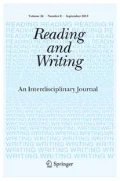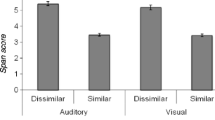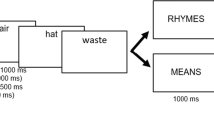Abstract
The aim of the current study was to further explore the connection between verbal short-term recall and phonological processing for two purposes: (a) To investigate the basis of short-term memory deficits for children with reading disability, and (b) To further explore the origin of developmental verbal memory span increases.
Using a variety of memory and phonological tasks, reading group comparisons were conducted testing third-grade good readers and poor readers, and developmental changes were studied with pre-kindergarten, first-grade and third-grade children. The main finding was that a strong relationship was observed between efficiency of phonological processes and capacity of verbal memory supporting the hypothesis that reducing phonological processing requirements in verbal short-term memory increases available resources for storage. No such relationship was found between phonological processing and nonverbal memory. This conclusion was supported by two findings: (a) The verbal short-term memory deficits in poor readers significantly correspond with less accurate phonological processing, and (b) Developmental increases in verbal STM are accompanied by more accurate and rapid execution of phonological tasks.
Similar content being viewed by others
References
Apthorp, H. 1988. Phonetic coding in reading disabled community college students. Unpublished doctoral dissertation, The University of Connecticut, Storrs, Ct.
Baddeley A. 1986. Working memory. Oxford: Clarendon Press.
Baddeley, A. D., Thomson, N. and Buchanan, M. 1975. Word length and the structure of short-term memory. Journal of Verbal Learning and Verbal Behavior, 14, 575–589.
Blalock, J. 1982. Persistant auditory language deficits in adults with learning disabilities. Journal of Learning Disabilities, 15, 604–609.
Brady, S. 1986. Short-term memory, phonological processing and reading ability. Annals of Dyslexia, 36, 138–153.
Brady, S., Mann, V. and Schmidt, R. 1987. Errors in short-term memory for good and poor readers. Memory and Cognition, 15, 444–453.
Brady, S., Poggie, E. and Rapala, M. In press. An investigation of speech perception abilities in children who differ in reading skill. Language and Speech.
Brady, S., Shankweiler, D. and Mann, V. 1983. Speech perception and memory coding in relation to reading ability. Journal of Experimental Child Psychology, 35, 345–367.
Brainerd, C. J. and Kingman, J. 1984. Do children have to remember to reason? A fuzzytrace theory of transitivity development. Developmental Review, 4, 311–377.
Brainerd, C. J. and Kingman, J. 1985. On the independence of short-term memory and working memory in cognitive development. Cognitive Psychology, 17, 210–247.
Brainerd, C. J. and Reyna, V. F. 1988. Generic resources, reconstructive processing, and children's mental arithmetic. Developmental Psychology, 24, 324–334.
Carroll, J. B., Davies, P. and Richman, B. 1971. Word frequency book. New York: American Heritage Publishing Co.
Case, R., Kurland, D. M. and Goldberg, J. 1982. Operational efficiency and the growth of short-term memory span. Journal of Experimental Child Psychology, 33, 386–404.
Catts, H. Speech production deficits in developmental dyslexia. Manuscript submitted for publication.
Catts, H. 1986. Speech production/phonological deficits in reading-disordered children. Journal of Learning Disabilities, 19, 504–508.
Chasty, H. 1986. What is dyslexia? A developmental language perspective. In M., Snowling (ed) Children's Written Language Difficulties (pp. 11–27). Windsor, Berkshire: Nf-Nelson.
Chi, M. T. H. 1976. Short-term memory limitations in children: Capacity or processing deficits? Memory and Cognition, 4, 559–572.
Cohen, R. L. and Netley, C. 1981. Short-term memory deficits in reading disabled children, in the absence of opportunity for rehearsal strategies. Intelligence, 5, 69–76.
Conrad, R. 1971. The chronology of the development of covert speech in children. Developmental Psychology, 5, 398–405.
Dempster, F. N. 1981. Memory span: Sources of individual and developmental differences. Psychological Bulletin, 89, 63–100.
Dunn, L. M. 1981. Peabody Picture Vocabulary Test-Revised. Circle Pines, MN: American Guidance Service, Inc.
Ellis, A. W. 1979. Speech production and short-term memory. In J., Morton and J. C., Marshall (eds), Psycholinguistics 2: Structures and processes. pp. Cambridge: The MIT Press.
Ellis, A. W. 1980. Errors in speech and short-term memory: The effects phonemic similarity and syllable position. Journal of Verbal Learning and Verbal Behavior, 19, 624–634.
Engle, R. W. and Marshall, K. 1983. Do developmental changes in digit span result from acquisition strategies? Journal of Experimental Child Psychology, 36, 429–436.
Fowler, A. (in press). Grammaticality judgments and reading in second-grade children. Annals of Dyslexia.
Godfrey, J. J., Syrdal-Lasky, A. K., Millay, K. K. and Know, C. M. 1981. Performance of dyslexia children on speech perception tests. Journal of Experimental Child Psychology, 32, 401–424.
Halford, G. S. and Wilson, W. H. 1980. A category theory approach to cognitive development. Cognitive Psychology, 12, 356–411.
Hall, J. W., Wilson, K. P., Humphreys, M. S., Tinzmann, M. B. and Bowyer, P. M. 1983. Phonemic similarity effects in good vs poor readers. Memory and Cognition, 11, 520–527.
Hoosian, R. 1982. Correlation between pronunciation speed and digit span size. Perceptual and Motor Skills, 55, 1128.
Hulme, C., Thomson, N., Muir, C. and Lawrence, A. 1984. Speech rate and the development of short-term memory span. Journal of Experimental Child Psychology, 38, 241–253.
Huttenlocher, J. and Burke, D. 1976. Why does memory span increase with age? Cognitive Psychology, 8, 1–31.
Johnson, D. and Myklebust, H. 1967. Learning disabilities: Education principles and practices. New York: Grune and Stratton.
Johnston, R. 1982. Phonological coding in dyslexic readers. British Journal of Psychology, 73, 455–460.
Jorm, A. 1983. Specific reading retardation and working memory: A review. British Journal of Psychology, 74, 311–342.
Kail, R. 1979. The development of memory in children. San Francisco: W. H. Freeman and Company.
Katz, R. B., Shankweiler, D. and Liberman, I. Y. 1981. Memory for item order and phonetic recoding in the beginning reader. Journal of Experimental Child Psychology, 32, 474–484.
Klein, H. 1986. The assessment and management of some persisting difficulties in learning disabled. In M., Snowling (ed) Children's written language difficulties: Assessment and management (pp. 59–79). Windsor, Berkshire: Nfer-Nelson.
Kupin, J. J. 1979. Tongue twisters as a source of information about speech production. Unpublished doctoral dissertation, The University of Connecticut, Storrs, Ct.
Lange, G. 1978. Organization-related processes in children's recall. In P. A., Ornstein (ed), Memory Development in Children, Hillsdale, N.J.: Erlbaum.
Liberman, I. Y., Mann, V. A., Shankweiler, D. and Werfelmen, M. 1982. Children's memory for recurring linguistic and nonlinguistic material in relation to reading ability. Cortex, 18, 367–376.
Liberman, I. Y. and Shankweiler, D. P. 1985. Phonology and the problems of learning to read and write. Topical Issue: Remedial and Special Education, 6.
Liberman, I. Y., Shankweiler, D., Liberman, A. M., Fowler, C. and Fischer, F. W. 1977. Phonetic segmentation and recoding in the beginning reader. In A. S., Reber and D., Scarborough (eds), Toward a psychology of reading: The proceeding of the CUNY Conference. Hillsdale, N.J.: Erlbaum.
Locke, J. L. and Kutz, K. J. 1975. Memory for speech and speech for memory. Journal of Speech and Hearing Research, 18, 176–191.
Locke, J. L. and Scott, K. K. 1979. Phonetically mediated recall in the phonetically disordered child. Journal of Communication Disorders, 12, 125–131.
Luce, P. A., Feustel, T. C. and Pisoni, D. B. 1983. Capacity demands in short-term memory for synthetic and natural speech. Human Factors, 25, 17–32.
Mann, V. A., Liberman, I. Y. and Shankweiler, D. 1980. Children's memory for sentences and word strings in relation to reading ability. Memory and Cognition, 8, 329–335.
Mann, V. A. and Liberman, I. Y. 1984. Phonological awareness and verbal short-term memory: Can they presage early reading problems? Journal of Learning Disabilities, 17, 592–598.
Mann, V. A., Shankweiler, D. P. and Smith, S. 1985. The association between comprehension of spoken sentences and early reading ability: The role of phonetic representation. Journal of Child Language, 11, 627–643.
Mark, L., Shankweiler, D. and Liberman, Y. 1977. Phonetic recoding and reading difficulty in beginning readers. Memory and Cognition, 5, 623–629.
Mattingly, I. G., Studdert-Kennedy, M. and Megan, H. 1983, May. Paper presented at the meeting of the Acoustical Society of America, Cincinnati, Ohio.
Miller, G. A. 1956. The magical number seven, plus or minus two: Some limits on our capacity for processing information. Psychological Review, 63, 81–97.
Milner, B. 1971. Interhemispheric differences in the localization of psychological processes in man. British Medical Bulletin, 27, 272–277.
Olson, R. K., Davidson, B. J., Kliegl, R. and Davies, S. 1984. Development of phonological memory in disabled and normal readers. Journal of Experimental Child Psychology, 37, 187–206.
Palley, S. 1986. Speech perception in dyslexic children. Unpublished doctoral dissertation, The City University of New York.
Pascual-Leone, J. 1970. A mathematical model for the transition rule in Piaget's developmental stages. Acta Psychologica, 32, 301–345.
Rabbitt, P. M. A. 1968. Channel-capacity, intelligibility and immediate memory. Quarterly Journal of Experimental Psychology, 20, 241–248.
Read, C. Adults who read like children: The psycholinguistic bases. Unpublished manuscript, University of Wisconsin, Department of English, Madison.
Samuel, A. G. 1978. Organizational vs. retrieval factors in the development of digit span. Journal of Experimental Child Psychology, 26, 308–319.
Shankweiler, D. and Crain, S. 1986. Language mechanisms and reading disorders: A modular approach. Cognition, 24, 139–168.
Shankweiler, D., Liberman, I. Y., Mark, L. S., Fowler, C. A. and Fischer, F. W. 1979. The speech code and learning to read. Journal of Experimental Psychology: Human Learning and Memory, 5, 531–545.
Siegel, L. S. and Linder, B. A. 1984. Short-term memory processes in children with reading and arithmetic learning disabilities. Developmental Psychology, 20, 200–207.
Snowling, M. 1981. Phonemic deficits in developmental dyslexia. Psychological Research, 43, 219–234.
Snowling, N., Goulandris, N., Bowlby, M. and Howell, P. 1986. Segmentation and speech perception in relation to reading skill: A developmental analysis. Journal of Experimental Child Psychology, 41, 489–507.
Spring, C. and Capps, C. 1974. Encoding speed, rehearsal, and probed recall of dyslexic boys. Journal of Educational Psychology, 66, 780–786.
Spring, C. and Perry, L. 1983. Naming speed and serial recall in poor and adequate readers. Contemporary Educational Psychology, 8, 141–145.
Stanovich, K. E. 1982. Individual differences in the cognitive processes of reading: I. Word decoding. Journal of Learning Disabilities, 15, 485–493.
Stanovich, K. E. 1985. Explaning the variance in reading ability in terms of psychological processes: What have we learned? Annals of Dyslexia, 35, 67–96.
Tarver, S. G., Hallahan, D. P., Kauffman, J. M. and Ball, D. W. 1976. Verbal rehearsal and selective attention in children with learning disabilities. A developmental lag. Journal of Experimental Child Psychology, 22, 375–385.
Torgesen, J. K. 1978–1979. Performance of reading disabled children on serial memory tasks: A selective review of recent research. Reading Research Quarterly, 14, 57–87.
Torgesen, J. K. and Goldman, T. 1977. Verbal rehearsal and short-term memory in reading-disabled children. Child Development, 48, 56–60.
Torgesen, J. K. and Houck, D. G. 1980. Processing deficiencies of learning-disabled children who perform poorly on the digit span test. Journal of Educational Psychology, 72, 141–160.
Vellutino, F., Pruzek, R., Steger, J., and Meshoulam, V. 1973. Immediate visual recall in poor and normal readers as a function of orthographic-linguistic familiarity. Cortex, 9, 368–384.
Watkins, M. J., Watkins, O. C., and Crowder, R. G. 1974. The modality effect in free and serial recall as a function of phonological similarity. Journal of Verbal Learning and Verbal Behavior, 13, 430–447.
Werker, J. and Tees, R. 1987. Speech perception in severely disabled and average reading children. Canadian Journal of Psychology, 41, 48–61.
Woodcock, R. W. 1973. Woodcock Reading Mastery Test. Circle Pines, MN: American Guidance Service.
Author information
Authors and Affiliations
Rights and permissions
About this article
Cite this article
Rapala, M.M., Brady, S. Reading ability and short-term memory: The role of phonological processing. Read Writ 2, 1–25 (1990). https://doi.org/10.1007/BF00383371
Issue Date:
DOI: https://doi.org/10.1007/BF00383371




